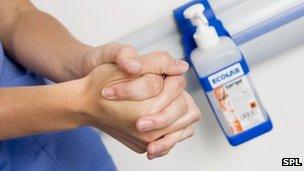Hand hygiene campaign 'cut superbug infections'
- Published

Clean hands reduce the risk of spreading infection
The campaign to improve hand hygiene in hospitals in England and Wales contributed to a significant fall in the rates of superbug infections, according to a report.
The study <link> <caption>published on the BMJ website</caption> <url href="http://www.bmj.com/cgi/doi/10.1136/bmj.e3005" platform="highweb"/> </link> showed the amount of soap and hand gel being used tripled during the campaign.
At the same time, levels of MRSA and C. difficile infections in hospitals fell.
The government has since dropped the campaign, but said its ambition was to "wipe out" such infections.
Hospital superbugs were once a real fear for many patients. In response the <link> <caption>Clean Your Hands campaign</caption> <url href="http://www.npsa.nhs.uk/cleanyourhands/" platform="highweb"/> </link> , funded by the Department of Health, was introduced in all hospitals by June 2005.
Alcohol gels were put by bedsides, posters reminded staff to wash their hands and there were regular checks to ensure hands were kept clean.
By 2008, the total amount of soap and alcohol gel being purchased by hospitals trebled, going from 22ml per patient per day to 60ml per patient per day.
Rates of MRSA more than halved in the same time period and C. diff infections fell by more than 40%.
'Success story'
One of the report's authors, Dr Sheldon Stone from the Royal Free University College London Medical School, estimated that around 10,000 lives were saved because of the campaign.
He told the BBC: "It's been a real British success story, we've gone from being the dirty man of Europe to being world leaders.
"What we need to do is keep up the momentum and stay at the forefront of world hand hygiene."
A spokesman from the Department of Health said: "The Clean Your Hands campaign was successful in its aim to highlight the importance of good hand hygiene practice across the NHS. We know this has been successful.
"The challenge now is to ensure the NHS embeds the good practice highlighted in the campaign to achieve our ambition to wipe out avoidable healthcare-associated infection.
"We know real progress has been made in this area as MRSA bloodstream infections have dropped by 41% and C. difficile by 30% across the NHS in England since 2009/10."